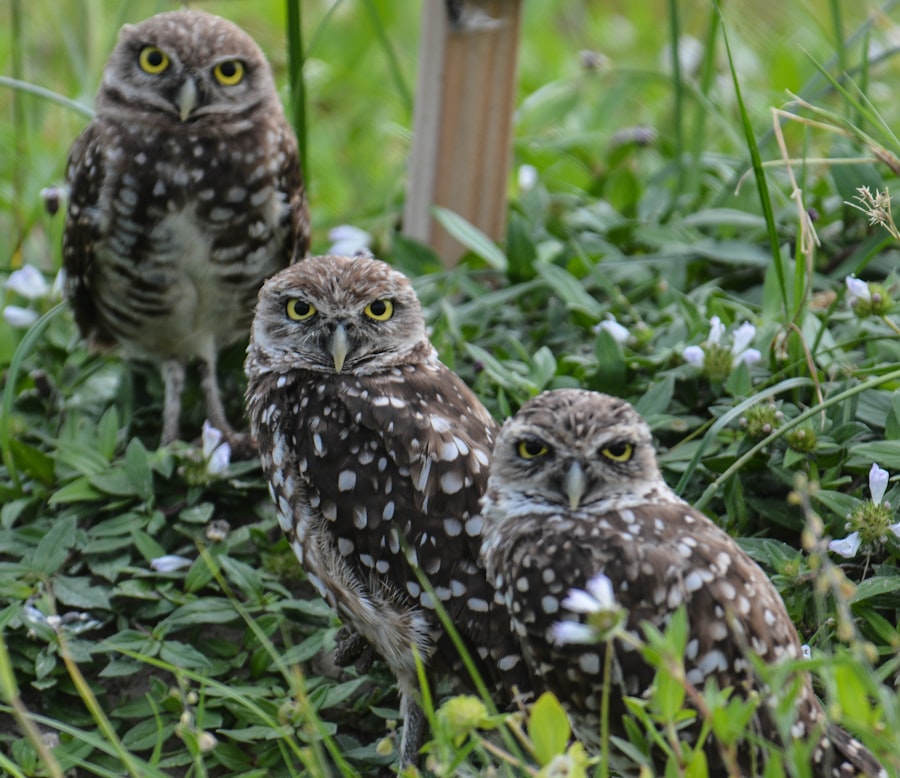Owls attacking chickens can be a frustrating and devastating problem for poultry owners. Not only can these attacks result in the loss of valuable birds, but they can also cause stress and anxiety for both the chickens and their owners. It is important to understand the reasons why owls attack chickens and to take steps to protect your flock. By fortifying your chicken coop and implementing deterrents, you can create a safe and secure environment for your chickens.
Key Takeaways
- Owls attack chickens because they are a natural prey and a source of food.
- Chicken coops should be assessed for potential vulnerabilities such as holes, gaps, and weak spots.
- Fortifying the chicken coop with sturdy materials and locks can prevent owl attacks.
- Proper lighting and sound deterrents can scare off nocturnal predators like owls.
- Visual deterrents and removing attractants like food and water sources can also help keep chickens safe from owl attacks.
Why Owls Attack Chickens: Understanding Their Behavior
There are several reasons why owls may attack chickens. One of the main reasons is hunger. Owls are predators and need to hunt for food to survive. If they see an opportunity to catch an easy meal, such as a chicken in an unprotected coop, they may take advantage of it. Additionally, owls may attack chickens out of territorial behavior. They may see the chickens as intruders in their territory and attempt to drive them away. Finally, owls have instinctual hunting habits that drive them to pursue any potential prey that moves or makes noise. Chickens, with their quick movements and loud clucking, can be irresistible targets for owls.
Assessing Your Chicken Coop: Identifying Potential Vulnerabilities
To protect your chickens from owl attacks, it is important to assess your chicken coop for potential vulnerabilities. Start by inspecting the walls, roof, and floor of the coop for any holes or gaps that could allow an owl to enter. Even small openings can be exploited by these agile predators. Additionally, check for weak spots in the structure that could be easily broken or damaged by an owl’s talons or beak. It is also important to ensure that all doors and windows are secure and have locks that cannot be easily opened by an owl.
Fortifying Your Chicken Coop: Securing the Structure
Once you have identified any potential vulnerabilities in your chicken coop, it is time to fortify the structure. One of the most effective ways to do this is by reinforcing the walls and roof. Use sturdy materials, such as thick plywood or metal, to make it difficult for an owl to break through. Additionally, consider adding locks or latches to all doors and windows to prevent them from being opened by an owl. It may also be beneficial to install a wire mesh or netting around the perimeter of the coop to create an extra layer of protection.
Installing Proper Lighting: Deterrents for Nocturnal Predators
Proper lighting can be an effective deterrent for nocturnal predators like owls. Owls are typically more active at night, so having well-lit areas around your chicken coop can make them feel exposed and vulnerable. Install motion-activated lights near the coop and any areas where an owl may try to access it. This will startle the owl and make it think twice before attempting an attack. Additionally, consider using lights with a red or orange tint, as these colors are less likely to attract owls.
Using Sound Deterrents: Scaring Off Owls with Noise

Sound deterrents can also be effective in scaring off owls. Loud noises can startle and intimidate these predators, making them think twice before attacking your chickens. Consider installing alarms or sirens near your chicken coop that can be activated remotely if you see an owl approaching. You can also play loud music or use noise-making devices specifically designed to deter birds. However, it is important to use sound deterrents responsibly and considerate of your neighbors.
Creating Physical Obstacles: Making it Difficult for Owls to Access the Coop
Creating physical obstacles can make it difficult for owls to access your chicken coop in the first place. One effective method is to install netting or wire mesh around the perimeter of the coop. This will create a barrier that owls cannot easily penetrate. Make sure the netting or mesh is securely attached and extends at least a few feet above the ground to prevent owls from crawling under it. Additionally, consider adding spikes or other deterrents to any ledges or perches where an owl may try to land.
Using Visual Deterrents: Scaring Off Owls with Visual Cues
Visual deterrents can also be effective in scaring off owls. Owls are wary of unfamiliar objects and may be deterred by visual cues that suggest danger. One popular method is to use scarecrows. Place scarecrows near your chicken coop to create the illusion of a human presence and deter owls from approaching. Reflective tape or shiny objects can also be effective in scaring off owls, as they create flashes of light that can startle and confuse the predators. Finally, consider using fake predators, such as plastic owls or hawks, to create the impression that your coop is already occupied by a larger and more dangerous bird.
Removing Attractants: Keeping Food and Water Sources Away from the Coop
To minimize the risk of owl attacks, it is important to remove any potential attractants from the vicinity of your chicken coop. Owls are opportunistic hunters and will be drawn to areas where there is an abundance of food and water. Keep your chicken feed stored securely in airtight containers to prevent it from attracting owls. Additionally, make sure any water sources, such as buckets or troughs, are covered or placed in areas that are not easily accessible to owls. By removing these attractants, you can reduce the likelihood of an owl targeting your chickens.
Maintaining a Safe and Secure Environment for Your Chickens
In conclusion, protecting your chickens from owl attacks requires a combination of fortifying your chicken coop and implementing deterrents. Assess your coop for potential vulnerabilities and take steps to secure the structure. Install proper lighting and use sound deterrents to scare off owls. Create physical obstacles and use visual deterrents to make it difficult for owls to access the coop. Finally, remove any potential attractants from the vicinity of the coop. By following these steps, you can create a safe and secure environment for your chickens and minimize the risk of owl attacks.
If you’re looking for ways to protect your chickens from owls, you might also be interested in learning about the incubation period for goose eggs. Understanding this crucial aspect of breeding geese can help you ensure a successful hatching process. Check out this informative article on Poultry Wizard: What is the Incubation Period for Goose Eggs? It provides valuable insights and tips for anyone involved in geese breeding.
FAQs
What are the common types of owls that prey on chickens?
The most common types of owls that prey on chickens are the great horned owl, barred owl, barn owl, and screech owl.
Why do owls attack chickens?
Owls attack chickens because they are a source of food. Chickens are easy prey for owls because they are often kept in open areas and are not able to fly away quickly.
What are some signs that an owl is attacking my chickens?
Some signs that an owl is attacking your chickens include missing chickens, feathers scattered around the coop or yard, and talon marks on the chickens.
How can I keep owls away from my chickens?
You can keep owls away from your chickens by using deterrents such as motion-activated lights, reflective tape, and scarecrows. You can also provide your chickens with a secure coop and run that is covered with netting or wire mesh.
Are there any natural predators of owls?
Yes, there are natural predators of owls such as eagles, hawks, and other larger birds of prey. However, these predators are not always present in the same areas as owls.
Is it legal to kill owls that are attacking my chickens?
No, it is not legal to kill owls that are attacking your chickens. Owls are protected under the Migratory Bird Treaty Act and killing them can result in fines and other legal consequences.
Meet Walter, the feathered-friend fanatic of Florida! Nestled in the sunshine state, Walter struts through life with his feathered companions, clucking his way to happiness. With a coop that’s fancier than a five-star hotel, he’s the Don Juan of the chicken world. When he’s not teaching his hens to do the cha-cha, you’ll find him in a heated debate with his prized rooster, Sir Clucks-a-Lot. Walter’s poultry passion is no yolk; he’s the sunny-side-up guy you never knew you needed in your flock of friends!







